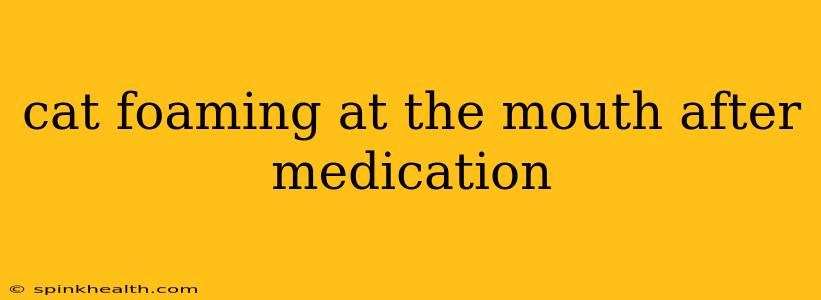Cat Foaming at the Mouth After Medication: A Vet's Guide to Understanding and Addressing the Issue
My name is Dr. Emily Carter, and I've spent the last fifteen years caring for cats. One of the most frightening things a cat owner can witness is their beloved pet foaming at the mouth, especially after administering medication. This isn't something to take lightly. While there are many reasons a cat might exhibit this symptom, medication is a significant consideration, and immediate veterinary attention is crucial. This post aims to illuminate the potential causes, provide guidance, and emphasize the importance of seeking professional help.
What are the common causes of foaming at the mouth in cats?
Foaming at the mouth (ptyalism) isn't a disease itself; it's a symptom that points to an underlying problem. In the context of medication, there are several possibilities. Sometimes, the medication itself might be the culprit, causing an adverse reaction. Other times, the foaming is a result of a pre-existing condition the medication was intended to treat. It's essential to differentiate between these possibilities.
Can certain medications cause cats to foam at the mouth?
Absolutely. Certain medications can trigger adverse reactions in cats, including excessive salivation and foaming. This is often an allergic response, but it can also be a side effect of the drug itself. The severity can range from mild to life-threatening, making immediate veterinary assessment necessary. Never try to treat this at home.
My cat is foaming at the mouth after taking medication. What should I do?
This is an emergency. Immediately contact your veterinarian or the nearest emergency animal hospital. While waiting, carefully observe your cat's behavior, noting any other symptoms like vomiting, diarrhea, lethargy, difficulty breathing, or seizures. Write down the name and dosage of the medication administered and the time of administration. This information will be vital for your vet.
What are the possible underlying conditions contributing to foaming at the mouth after medication?
The foaming might not be directly caused by the medication but rather a symptom of an underlying illness. The medication might be interacting poorly with the existing condition, exacerbating symptoms. Kidney disease, liver disease, or gastrointestinal issues can manifest as excessive salivation, particularly when paired with medication.
Is it an allergic reaction?
An allergic reaction is a serious possibility. Symptoms can range from mild skin irritation to severe anaphylaxis, which can be life-threatening. Foaming at the mouth, coupled with swelling, hives, difficulty breathing, or collapse, strongly indicates an allergic reaction requiring immediate veterinary attention.
How can I prevent this from happening again?
Prevention is crucial. Open communication with your vet is paramount. Discuss any pre-existing conditions your cat has, along with all medications (including over-the-counter products) they are taking. Let your vet know about any unusual behavior or adverse reactions, no matter how minor they seem. Your vet might suggest alternative medication or adjustments to the dosage.
Disclaimer: This information is for educational purposes only and should not be considered medical advice. Always consult your veterinarian for any health concerns regarding your cat. Early intervention is key to managing potential complications and ensuring your cat's well-being. If your cat is foaming at the mouth, seek immediate veterinary help.

